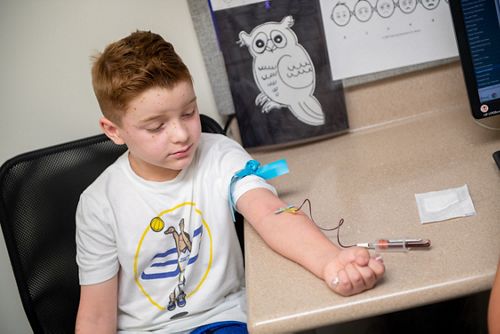What is a blood chemistry study?
A blood chemistry study is a lab test that measures the amounts of certain chemicals and substances in the blood such as:
- Electrolytes
- Enzymes
- Fats (lipids)
- Proteins
- Glucose (sugar)
- Hormones
- Vitamins
- Minerals
There are different types of blood chemistry studies.
Some of the tests require your child to fast (not eat or drink) before the test. Your care team will let you know how to prepare.
Benefits of blood chemistry studies
Blood chemistry studies show how well the body functions. Your care team uses this information to:
- Assess your child’s overall health
- Diagnose a disease or other medical problem
- Identify and monitor side effects
- Know if a disease or condition is improving or getting worse
- Understand if a treatment is working
Types of blood chemistry studies
There are different types of blood chemistry studies. The care team may order a single test. Or they may order a panel, which uses a single blood sample to do many tests.
Electrolytes are minerals that help keep levels of acids and bases balanced in the body. They include sodium, potassium, chloride, and bicarbonate. Abnormal electrolyte levels may be a sign of dehydration (water loss), kidney disease, liver disease, heart failure, or high blood pressure.
Kidney tests measure levels of certain substances, minerals, proteins, glucose, and electrolytes. Substances measured may include albumin (a protein in blood), blood urea nitrogen (BUN), and creatinine. Kidney testing may also include a test called the estimated glomerular filtration rate, which shows how well the kidneys work. Abnormal test results may be signs of kidney problems or kidney late effects from disease treatments.
Liver tests measure liver function. Substances measured may include alanine aminotransferase (ALT), alkaline phosphatase (ALP), aspartate transaminase (AST), bilirubin, albumin, and total protein. Abnormal levels of these substances may be signs of liver problems.
Basic metabolic panel (BMP)
These tests can provide information about kidney and respiratory system (breathing) function, glucose levels, electrolyte, and acid/base balance.
- A comprehensive metabolic panel (CMP) is a basic metabolic panel with added liver function tests and certain blood proteins.
- The lipid panel measures total cholesterol, high-density lipoproteins (HDL), low density lipoproteins (LDL), and triglycerides.
- Other tests may include thyroid and reproductive hormones, tumor markers that show signs of cancer or non-cancerous tumors, levels of iron and vitamins, and how well the heart works (cardiac function).
Getting ready for a blood chemistry study
Follow your care team’s instructions before the test. Your child may need to fast (not eat or drink) for a certain amount of time before the test. Eating or drinking before the blood sample is taken could affect the results.
Medicines and supplements may also change the test results. Let your care team know if your child is taking any:
- Medicines (prescription or over-the-counter)
- Vitamins
- Herbal products
Talk to your care team if you have questions.
What to expect during the blood chemistry study
A care team member will insert a needle into your child’s vein to get a blood sample. They will collect the blood sample in vials or tubes.
The care team can also get a blood sample from your child’s central venous catheter (central line). If your child does not have a device, the care team may choose to start an IV to get multiple blood samples.
The care team will send the blood sample to the lab for study. The results will be reported to your care provider.
Possible risks of blood chemistry studies
A blood chemistry study requires taking a blood sample. It is generally safe but possible risks include:
- Pain or discomfort at the needle site
- Bleeding or bruising
- Feeling dizzy or faint
- Infection
Questions to ask your care team




